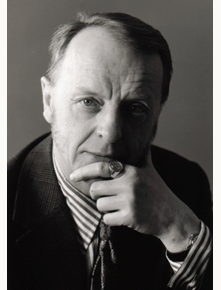Erling Bjøl
( historian, journalist) | |
|---|---|
 | |
| Born | 1 December 1918 Kalundborg, Denmark |
| Nationality | Danish |
| Interests | • • |
Danish Bilderberg historian | |
Erling Bjøl is a Danish historian, political scientist and journalist.[1]
Background
Erling Bjøl is the son of train driver H.M.I. Bjøl (died 1966) and his wife Johanne f. Nielsen. He became a student from the then Rungsted State School (Rungsted Gymnasium) 1937 and mag.art. 1948. He was a foreign policy employee at United Press 1938, Nationaltidende 1942, BBC in London 1944, Dagbladet Information 1945-59 and Politiken 1959.
During World War II, he fled to London and became part of the illegal press. For this effort he received Christian X's Medal of Remembrance.
In 1963 he became Professor of Political Science at Aarhus University (established 1967), where he was responsible for building the new subject international politics in the years up to 1983. In 1966 he became dr.scient.pol. In 1974 he was admitted to the Danish Society of Sciences.
Erling Bjøl's political science writing mainly covers French and Danish foreign policy, but he has also written on historical topics. In addition, he has for many years been a well-known political commentator in newspapers and on television. In 1993-94, Bjøl published his memoirs in two volumes.
In Why war? (1998) and How Peace? (2000) Bjøl has presented historical analyzes of the phenomena of war and peace. In The French Connection - from Holger Danske to Sarkozy (2008), Bjøl describes differences in mentality and culture between France and Denmark.
Events Participated in
| Event | Start | End | Location(s) | Description |
|---|---|---|---|---|
| Bilderberg/1973 | 11 May 1973 | 13 May 1973 | Sweden Saltsjöbaden | The meeting at which the 1973 oil crisis appears to have been planned. |
| Bilderberg/1981 | 15 May 1981 | 17 May 1981 | Switzerland Palace Hotel Bürgenstock | The 29th Bilderberg |